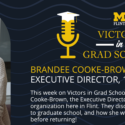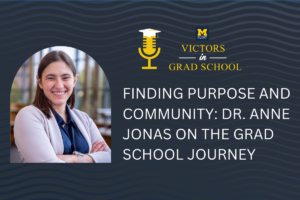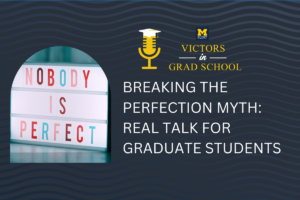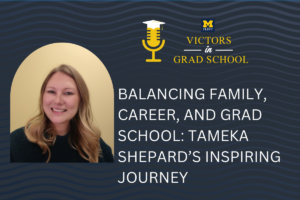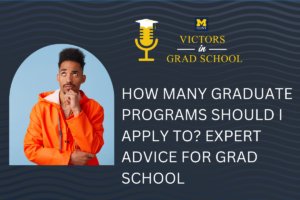In this episode of Victors in Grad School, We welcome Brandee Cooke-Brown, the Executive Director of 100k Ideas, a nonprofit organization in Flint, Michigan. We discuss Brandee’s journey from her undergraduate education at the University of Michigan to her decision to pursue a master’s degree after several years of working. Brandee explains that her path to graduate school was not a traditional one, and she joined a college advising program after her undergraduate degree and worked for a few more years before deciding to return to education.
Brandee talks about her transition back to school and how she had to manage her time effectively. She highlights the importance of carving out time and staying organized to succeed in graduate school. She shares her experience of attending virtual classes and how it allowed her to be more comfortable and engaged as an introverted student.
The conversation delves into how Brandee built strong relationships with her program adviser and professors, emphasizing that it was crucial to establish a connection with her instructors, which was something she did not excel at during her undergraduate studies. She also discusses the importance of making graduate school a part of her life and utilizing the knowledge gained from the program in her job at 100k Ideas, directly applying concepts learned from overall MPA program.
Brandee touches on the significance of her graduate degree in preparing her for her role at 100k Ideas and how it helped close gaps in her knowledge and build her confidence. She discusses the practicality of what she learned and its direct application in her nonprofit work.
The podcast episode concludes with Brandee talking about her recognition as one of the “40 under 40” individuals in Genesee County, which is a source of pride for both her and her organization, 100k Ideas. She reflects on the importance of stepping out of one’s comfort zone and taking action when pursuing higher education.
This episode serves as an insightful conversation about the value of graduate education, the importance of time management, building relationships with professors, and applying knowledge gained in a professional context. It offers valuable advice to aspiring graduate students.
This podcast is brought to you by The Office of Graduate programs at the University of Michigan-Flint. If you’re still wondering about other things to consider when it comes to graduate school, you can also contact the Office of Graduate Programs at UM-Flint. We’re here to answer questions Monday – Friday from 8:00 a.m. to 5:00 p.m. EST. You can also find out more about the 50+ programs that the university has to offer here.
TRANSCRIPT
Christopher Lewis [00:00:01]:
Welcome to the Victor’s in Grad School, where we have conversations with students, alumni, and experts about what it takes to find success in graduate school.
Christopher Lewis [00:00:11]:
Welcome back to Victors in Grad School. I’m your host doctor Christopher Lewis, director of graduate programs at the University of Michigan Flint. Really excited to have you back again this week. Every week, you and I are on a journey together, A journey into looking at this journey of graduate school of what it takes to find success in that graduate school journey, and for Every person in that journey is a little bit different, and it’s important to be able to learn from others. It’s important to be able to talk to one another And to be able to hear the stories of others because from everyone’s story, you’re gonna hear something a little bit different about what they had to do to be able to take Those steps and do what they had to do to find success post bachelor’s degree because it does take a little bit of different steps To be able to be successful in graduate school more so than your undergraduate degree as well. Every week, I love being able to bring you different guests, different people with different experiences That have gone through that graduate school journey themselves. And today, we’ve got another great guest with us. Brandee Cooke-Brown is with us today, and Brandee is the executive director of 100K Ideas, Which is a nonprofit in Flint, Michigan, and they are doing amazing things.
Christopher Lewis [00:01:29]:
And I am really excited to talk to her about her journey And having her here today. Brandy, thanks so much for joining us.
Brandee Cooke-Brown [00:01:37]:
Thanks for having me. I appreciate it.
Christopher Lewis [00:01:38]:
Well, I really appreciate your time today. I really appreciate you being here. Now I know you did your undergraduate work at the University of Michigan down in Ann Arbor, and then after a couple of years, we’ll say Couple of years after grad after your undergraduate degree
Brandee Cooke-Brown [00:01:56]:
You’re very generous.
Christopher Lewis [00:01:58]:
You decided to go back And you decided to get a master’s degree. So for every person, that journey is a little bit different, and there’s a reason find why people make that choice. So talk to me about what was going through your head, and what were the reasons that you chose to go back to graduate school After being in the workforce for a little bit.
Brandee Cooke-Brown [00:02:20]:
Unlike some of my fellow students when they were graduating, you know, a lot of them had Plans to go right into grad school or, you know, hey. We’re gonna work and then go back to grad school. They kind of had that plan figured out. I did not. I even say, like, I found my next Step after college by, like, literally the seat of my pants and, like, an amazing opportunity happened to exist, and I was able to join the Mission College advising core. But I joined that thinking, okay. That’s a 2 years, you know, of getting some real life experience. I’d be ready to go.
Brandee Cooke-Brown [00:02:46]:
I still was not. So I spent a couple more years working. I was able You get some really great experience in the private sector. And then a couple years into that, I ended up coming to Flint and meeting the cofounder of a 100 k ideas at an event that was being hosted at the Ferris School before it opened, and that’s where I got introduced to a 100 k ideas and kind of fast forward. I ended up in Flint Because of that job, which was awesome, and as things are kinda moving and things are going and, you know, I’m catching a rhythm into life here From where I originally was in Lansing, COVID happened. And because, you know, things kind of slowed all the way down in COVID, I was like, hey. I have some extra time. What else am I doing in my life? Maybe now is the time to look at going back.
Brandee Cooke-Brown [00:03:28]:
And I had had my eye on University of Michigan’s Flint’s program for quite a while. We’ll have the opportunity to talk to a couple people who have participated. And what I really liked about the program was that they understood as a We have life. There’s a lot of nontraditional students that go, many that have taken time off in between, and that was very appealing to me. And, also, this is proximity to where I was and the ability to be very flexible with where I was at that point in my life. You know, my daughter was 1 at the time. I think I’d just gotten into a role of leadership for a 100 k. So there was a lot of transition happening, and then let’s throw in a grad program at that, but it really honestly worked out at the perfect time.
Brandee Cooke-Brown [00:04:03]:
And so I kinda just jumped on it and just didn’t think about it. Like, application, I didn’t take too hard about it. I was like, let’s just go and then think we’re just rolling, and it turned out to be just such an amazing experience.
Christopher Lewis [00:04:14]:
Now for every student as they Especially if they take some time off between that undergraduate work and going to graduate work, there is going to be that shift and that Relearning that you have to go through to be able to not only get back into the the mode of learning from the mode of working, but then you’re also balancing all of the other things that you’re having to deal with. Talk to me first about What you had to do to be able to get back into the groove of being able to be back in school after taking that time off.
Brandee Cooke-Brown [00:04:49]:
Yeah. So a lot of it was Just carving out time and really getting organ like, just very organized. I thought I was organized, and I was not as organized as I thought until I had to incorporate those into my life. I am someone that does very well when I have, like, the set meeting and, like, the the to dos right after. And so that program, while again, started in COVID, all of it was virtual, but it was still class times. So it wasn’t just doing at the time, it was Blackboard. I think it switched over to Canvas, but not just having a class where I just logged in to Blackboard and had to participate during discussions. For me, it was very important that I did have, hey.
Brandee Cooke-Brown [00:05:22]:
In this evening, I’m having this class. And then it was, like, a dedicated time to focus, And that really helped me out kind of getting it into my routine. And that allowed me to kind of start slowly edging back into, okay, I need to carve out study time. I need to carve out this space. And so what I found was evenings right after class were very helpful for me even though sometimes classes would run late. That was a perfect time because I was already in the mode. So I had you know, I’d hang up the Zoom, and I’m like, okay. Let me just go ahead and dive right in.
Brandee Cooke-Brown [00:05:48]:
Let me start outlining notes. Let me start reading. Let me start doing something. And that was very helpful to me because weekends were always tough. And then anytime during the day, I’m already working, so I really would take those times where I was already in it To capitalize on that opportunity to be able to get a lot of stuff done. So then as, like obviously, there are times where the schedule is not that flexible and you’re really just spitting it in when you can. I kind of had an Organic practice by that point that I was able to kinda get myself back going.
Christopher Lewis [00:06:13]:
I just kinda talked to a lot about time management, And there are a lot of different things that go into being able to find success. And the program you went through was a few years long, so you had to Do that balancing for a while and have that time management going for a while. As you think about the journey that you went on through the entire program And you look at where you were at the beginning, where you were at the end, there had to have been other things outside of the time management piece probably that you had do to set yourself up for success and things that you had to do to be able to maintain that success throughout graduate school. Can you talk about that?
Brandee Cooke-Brown [00:06:49]:
The biggest thing was creating a relationship with The program adviser and my professors, that was something I did not do very well in undergraduate school. Ann Arbor’s pretty big. So, you know, trying to make yourself stand out is a little difficult, and being a very Introverted person I am, that was not a strength, but that was something I mentally noted as I was entering the program to do better. Like, I wanted to make sure they understood. Like, I cared about this. I was signing up for this. So when there were days where I might be struggling or I might need more time, it wasn’t like, who’s this random person coming up to me asking, you know, for help? But they actually, like, knew me. They knew I was serious about this program, and that was a great thing.
Brandee Cooke-Brown [00:07:23]:
And so really developing a relationship What doctor Sachs early on was very helpful, and she also is just an incredible adviser and person for that program. Like, I love her. But her Also, developing that relationship allowed me to kind of set the right tone because we were I was very clear, like, hey. This, you know, 2 classes a semester is Perfect. Like, please don’t add anything else to it. Where would that get me? Okay. That’s 3 years. Alright.
Brandee Cooke-Brown [00:07:45]:
So it’s 3 years. That’s just where we are. A little longer than I would have liked, but, you know, that is what it is. But it allowed me to set the tone for how I move forward. So relationship development was huge. And then really just also making it a part of my life, not Just like this thing to the side, but, like, oh, man. I gotta make sure I read or even talking about it at work. You know, a 100 k is being employed current college students.
Brandee Cooke-Brown [00:08:07]:
So a lot of them are Graduating and figuring out what that next stage is and are trying to figure out, do they wanna go to grad school? So really being vocal about what I was doing with everybody so that way they also understood, like, Okay. Brandy’s got this going on and not to be like, oh, that’s why I didn’t get this done, but really, like, no. Here’s, like, a whole new facet. Here’s what I’m learning from it. And then what I think is so great about the MPA program that I was Part of the public administration program is I was able to directly apply so much of what I was learning to my day to day life in nonprofit. So that’s what was the appeal of the program. And so to be able to, hey. Oh, I read this.
Brandee Cooke-Brown [00:08:41]:
Oh, wait. Let me take this back to work. We need to be doing this. Like, that Was fantastic, and I was in a position where I could actually implement those things. It wasn’t like I had to go and say, hey. I think we should do that. I could just, like, no. We need to do this, guys.
Brandee Cooke-Brown [00:08:52]:
Let’s go ahead and knock it out. And that was incredibly helpful for me as someone because it was really like I say, it became just a part of my life, an extension of what I was doing in it just so beautifully with everything I was already working on.
Christopher Lewis [00:09:04]:
One of the things that you were just talking about was the fact that in graduate school that you had to develop strong relationships with your adviser, your faculty, and you didn’t do that well in undergrad. What did you have to do? What steps did you have to follow to be able to not only create that first relationship, but also to Build upon, foster, cultivate, and make that relationship stronger to maintain it throughout your graduate school experience.
Brandee Cooke-Brown [00:09:37]:
Ironically, I feel like being virtual helped me thrive. That makes sense. Again, being very introverted. Virtual, it’s a little awkward when people come off mute, and you’re trying the time to talk, but for me, that was perfect because there wasn’t pressure. I was just at home. So, you know, I’d have an opinion, so I’d speak up in class and be able to give my opinion and I was engaged in listening, so that was very helpful. And, you know, again, doctor Sachs was very open with office hours, so I made sure to attend those. Whether I had her as a Teacher at that semester or not, we would go, you know, for coffee and just say, hey.
Brandee Cooke-Brown [00:10:07]:
How are things going? You know, how are you doing? Here’s what’s going on. And, you know, she would get to know me. And then what was also great about being virtual people could see my life. My daughter literally was growing up in front of like, we were all. Like, at a point, it’s the same bunch of you in the same classes, You know, each semester, so they’re, like, watching her grow up behind me while she’s growing up and running behind the scenes. So that was also a connection that people were making with me as well as, like, with my professors. And then luckily, a couple of them, I kinda got lucky because I knew them outside of school. So I actually, You know, I had developed a relationship with them.
Brandee Cooke-Brown [00:10:39]:
They happen to be faculty at U of M Flint, so that was an awesome plus there because then I also could, you know, lean on them a little heavier because I could say, oh, hey. Well, you know my flight. You know? Here’s what we’re doing. How do I apply this? You know? You know a little bit more about what’s going on. And so, again, I was Trying to be very intentional in developing those relationships and not just when I needed something, but to kind of, you know, really Be like, hey. How are things going? Like, what’s going on? Which is not normal for me in general, but really trying to be proactive about that, and realizing also that these relationships maintain past this point. Right? Like, it’s not just grad school is not the one, stop for these relationships. You wanna keep them going and keep facilitating them over all these of these years.
Christopher Lewis [00:11:23]:
You know, I love that because I mean, I think that It’s so important. I mean, it’s so important for you to be able to build those relationships, not only with your faculty, but with your peers and Being able to learn from their experiences as well because they are gonna bring different things, a different dynamic, a different diverse background to the classroom as well. And in a perfect scenario, you all bring all of that together to have this Beautiful mixing pot of of experiences that help you to be able to take the information that you’re learning And turning it into something better. And in graduate school, that’s the thing that a lot of times you don’t get out of undergrad because of the fact that So many undergrads are very they’re traditional age, and they’re going through it, and they don’t have the other experiences to bring into the mix. So they’re learning more from the person in front of you versus all around you. And and I think that’s one of the things that’s kind of unique about that.
Brandee Cooke-Brown [00:12:22]:
Absolutely.
Christopher Lewis [00:12:23]:
Now you’ve kind of talked a little bit about this, but you completed your graduate degree. You’ve had it now for a few years. And As you look at the work that you do at 100 k ideas, how do you feel that the graduate degree has prepared you for the work that you’re doing on a daily basis?
Brandee Cooke-Brown [00:12:40]:
Oh, beyond. It’s one of those things where I had a little bit of impostor syndrome when I came into this leadership position. That was one of the catalyst For getting my grad degree, like, yes. It was COVID. There was a lot of things going on. I’d wanted to do it. But this specific degree, you know, being in public administration with a nonprofit with a nonprofit concentration, I thought, would help close some of those gaps I was learning on the fly. Like, I, you know, was able to pick up things pretty quickly, but Having kind of that background of, hey.
Brandee Cooke-Brown [00:13:06]:
Well, this is why this exists. Here’s the background. Here’s the understanding. Here’s kind of how all of these connect together was Fantastic because it really did close a lot of gaps in how we could operate and also our potential for how we move forward. And what wild as I remember, we were one of the classes we were doing logic models and, you know, evaluation plans, and that’s central to a lot of nonprofits because a lot of your grant funders asking you for your logic, your evaluation plan. And I was like, oh, look at this. This is perfect. And I was able to also leverage a 100 quay quite a bit And using that as an opportunity to help both.
Brandee Cooke-Brown [00:13:38]:
Right? Like, help, you know, my organization by using these projects as a way to kind of explore areas in my traditional work in my day to day, I would not have the ability to do. So it really allowed me to put into practice immediately what was going on. And so, again, it helped kind of alleviate that. Do I know what I’m doing? You know, it kinda helps 1 of my favorite. You’re on the right track. You got this. But then add that credential to be like, no. You really do actually know what you’re doing.
Brandee Cooke-Brown [00:13:59]:
You can feel confident in In what you know and what you’re doing and how you’re moving forward. And that’s one thing I will say, and I told this to doctor Sacks. When my program was ending, I was like, no. I appreciate you so much that everything was applicable. Like, there was nothing I felt like was a throwaway class. There was nothing I felt like I didn’t take anything from her. I just did it to get the credit. Like, everything was able to be used, and I’ve been able to use it in different facets of my position.
Christopher Lewis [00:14:22]:
Now one of the things that you kinda get surprised with over the last year was being recognized and as One of the 40 under 40 in Genesee County area. And talk to me about that and what that’s meant to you and your organization.
Brandee Cooke-Brown [00:14:37]:
Oh, it meant a lot. I mean, it’s there’s a lot of people in this area. So to be named 1 of 40, and I also don’t consider myself that close to 40, so I feel like I had some time to make it. It’s pretty awesome, but also just to see the company I’m in. And these are people that I look at every day as, oh my gosh. You guys are doing such awesome things. Like, you know, one day I wanna be like you. So To be put into that company and to see that, yes, I’m being recognized, but, really, it’s a 100 k that’s also being recognized for doing great things is awesome.
Brandee Cooke-Brown [00:15:03]:
And I will never I take that for granted. Ironically, at that event is when I realized one of the people I knew on the list was also in the MPA program. So initially, we were like, Yeah. How are you? How are things going? And so we were able to make a, you know, additional connection on top of the one we already had. And so, again, this community has a lot of amazing people doing great things. And so to be able to be among that group was pretty special.
Christopher Lewis [00:15:25]:
It definitely is special and definitely a great opportunity, like you said, for your nonprofit to get To get notoriety, but also for you to be recognized for the work that you do. Now thinking back at graduate school and the experience that you had in that graduate school experience, Maybe even thinking back to that younger self, that student back in at Ann Arbor going through the motions, maybe not exactly knowing exactly where she was going. What are some tips that you might offer your younger self or others that are considering graduate education that would help them define success?
Brandee Cooke-Brown [00:15:56]:
Well, first, I would say don’t think too hard about it. Like, I think that’s where we get our we get in our heads too much, and we can talk ourselves out of anything. And that’s something I did a lot As an undergraduate student, whether it came to joining a club or, hey. I’m gonna go to this meeting or I’m gonna engage in this way. I would be able to talk myself out of it because it was so far my comfort zone at that time. And so I really made a point of, if I have to second guess it because it’s a comfort situation, then I just need to go ahead and go Right. That’s why, like, it’s obviously a challenge I need to to explore. And so that’s really the biggest thing is just getting outside of your own head and really just going for the things that you want.
Brandee Cooke-Brown [00:16:30]:
I’ve realized, like, you can’t sit and hope that someone notices you or sit and, you know, hope that something happens. There’s some action that has to go behind that. It’s very important to kinda just keep pushing yourself. Don’t get complacent of where you are. Because, again, like, it’s kind of the whole reason part of me also went to grad school. Right? Because at that point, I’m like, okay. I’m in a teen. I got it.
Brandee Cooke-Brown [00:16:48]:
You know? Yeah. Things got a little appended because of COVID, but not much. But it’s just not like, okay. Well, I’m just in this. What’s next? What’s next? What’s next? And that was Mind what’s next. And so I’m so glad I did it. So that’s the thing I think if anybody’s wondering or sitting on if there’s the right time. I think there’s never a right Time for anything, and so you kinda just have to jump in when when you feel the urge or you feel the pull.
Christopher Lewis [00:17:08]:
Well, Brandy, I just wanna say thank you. Thank you for Sharing your story, and thank you for all that you’re doing with 100 k ideas to push individuals to think differently and to Encourage young people to think differently, and I wish you all the best.
Brandee Cooke-Brown [00:17:23]:
Thank you so much, and thank you so much for having me. This has been awesome.
Christopher Lewis [00:17:26]:
The University of Michigan Flint has a full array of masters and doctorate programs if you are interested in continuing your education. Whether you’re looking For in person or online learning options, the University of Michigan Flint has programs that will meet your needs. For more information on any of our graduate programs, visit umflint.edu/graduateprograms to find out more. Thanks again for spending time with me as you prepare to be a Victor in grad school. I look forward to speaking with you again soon as we embark together on your graduate school journey. If you have any questions or want to reach out, Email me at flintgradoffice@umflint.edu.

